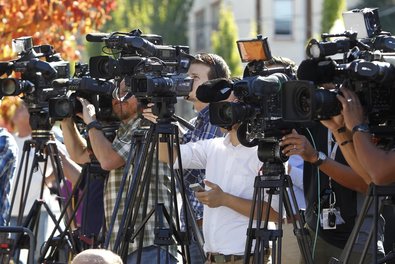
   |

How Should the News Media Cover Mass Shooters?
Sheriff John Hanlin of Douglas County, Ore., tried unsuccessfully to get the news media to not name the shooter in the recent mass killings at the Oregon community college last week. His approach was part of a “Don’t Name Them” campaign that seeks to combat the glorification by some of murderers and the contagion factor. How should the news media deal with the murderers in these mass killings and the possible effect the coverage could have on copycat crimes?
* sheriff = 보안관(미국에서 county나 town의 민선 치안 담당관)/ mass killing = 다중 살인/ combat = 방지하다, 싸우다/ glorification = 미화; 찬미, 찬양, 찬송/ contagion factor = 전염[파급] 요인/ coverage = (신문・텔레비전・라디오의) 보도[방송]/ copycat crime = 모방 범죄 ![]() 여러 다중 살인과 모방 범죄에 영향을 줄 수 있는 보도를 뉴스 매체는 어떻게 다루어야 하나요?
여러 다중 살인과 모방 범죄에 영향을 줄 수 있는 보도를 뉴스 매체는 어떻게 다루어야 하나요?
1. Consider a Different Ethical Approach
If there are steps journalists can take to help reduce the frequency of these slaughters — while still reporting aggressively and robustly — we should seriously consider them.
2. Information Is Light
We need more data for real research to help law enforcement discern trends. We need more to avoid misinformation and conspiracy theories bred by ignorance and confusion.
3. Whatever You Do, Avoid the Racial Stereotypes
Racialized narratives pushed in news media outlets tap into our tense racial climate and politics of gun control.
Sample Essay
When Covering Mass Shooters, Avoid the Racial Stereotypes
Lone wolf. Troubled. Mentally ill.
These words used to describe mass murderers are the ritual words of absolution the news media give to coverage of gun violence in America. But more often than not, those ritualized words give absolution to white male shooters, and not others. Being “alone” bought them to a troubled place, bringing on mental illness, which caused them to shoot multiple people.
Describing shooters in these terms places them above society, relegating them to a special status. In a study published in The American Journal of Public Health, the authors, Jonathan Metzl and Kenneth MacLeish, find that in mass shootings "notions of mental illness" mirror "cultural stereotypes and anxieties" about "race/ethnicity, social class and politics.”
By labeling white male shooters mentally ill, while shooters of color are thugs and terrorists, the news media reinforces the narrative that the lone wolf is an aberration. It also taps into a distinctive narrative of individuality and self-reliance Americans embrace. Rather than decrying the shooter for breaking the bonds of community, describing shooters in this manner removes them from the fabric of civil society, making them an outsider.
Thugs and terrorists (again, usually people of color) are also outsiders. They are seen as threats to civil society. These racialized narratives pushed in news media outlets tap into our tense racial climate and politics of gun control.
It may be tempting to think of the use of mental illness and gun use as a recent narrative, but that is not the case In the same study, Metzl and MacLeish point out that pro-gun black political leaders of the 1960s like Malcolm X were characterized as schizophrenic by the F.B.I. and other groups to begin the public push for gun control.
Today, I suspect that the news media's use of these terms to describe white male mass shooters are an excuse for vilifying the mentally ill, and continuing gun sales.
I'd like to see more profiles of the shooters in press reports that refrain from the ritual news media diagnosis of "lone wolf," "thug" or "terrorist." Maybe then we could have a more honest dialogue about what drives people to pick up a gun and commit such heinous acts regardless of the color of their skin.
   |




